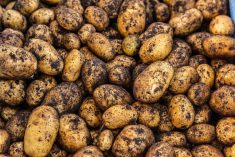“This study shows that the Canadian Climate Advantaged Diet is currently a theoretically
possible approach.”
Winter woes aside, Western Canada’s colder climate may prove very good for what ails us.
Following the release of the CAPI report last August the Manitoba Agri-Health Research Network commissioned an assessment of the clinical data established by the Manitoba research community, for five commercial crops, plus several emerging Manitoba crops that may offer distinct advantages to the human diet because of where they grow.
Read Also

Manitoba sunflower plant gets local owners
Scoular’s sunflower and bird feed plant in Winkler, Man., bought by Orenda Commodity Services Ltd. out of Ste. Agathe.
Some research has shown certain crops grown on the Canadian Prairies, such as potatoes and oilseeds, being subject to a more demanding growing condition, produce higher levels of key health constituents.
The MARHN report, produced with support from Manitoba Agriculture, Food and Rural Initiatives (MAFRI) refers to this phenomena as the Canadian Climate Advantaged Diet (CCAD).
The study provides a benchmarking assessment of the scientific data supporting a “Canadian Climate Advantaged Diet” (CCAD) by identifying the linkages, where they exist, between human consumption of these crops and impact on diet-related health concerns. It also looks at how climate and production technologies may enhance the efficacy of health-giving bioactive compounds in these crops.
Five commercial crops are included in the assessment – canola, flaxseed, pulses, whole grains (such as wheat, wheat bran, oats and barley), and potatoes – plus emerging crops such as hemp, buckwheat, saskatoons and other berry crops.
All show strong, or emerging scientific evidence of health benefits such as helping prevent cardiovascular disease (CVD) and diabetes.
The crops were selected for inclusion in the CCAD because they are produced
locally and are currently the focus of research and industry development across Western Canada, and in particular in Manitoba.
This is a first-in-Canada document, put together by Manitoba’s unique cluster of life sciences’ researchers, says Kelley Fitzpatrick of Nutritech Consulting and author of the report, expected to be released this month.
“No other province has gone as far as we have in trying to put all these pieces in place,” said Fitzpatrick.
The CCAD report includes a number of recommendations including calls for continued clinical research to substantiate health claims. “Several CCAD crops including flaxseed and pulses lack the appropriate scientific substantiation for global health claim approval,” the executive summary notes.
More agronomic research under Manitoba’s growing conditions is another recommendation. “One of the foundations of the CCAD is that crops produced in Western Canada are of higher quality with regard to their health constituents due to cooler environmental growing conditions,” the summary says, but “data to support such statements is weak for many Prairie crops with the exception of oil seeds and potatoes (in the case of plant vigour.)”
It also cites need for gathering expertise in behavioural sciences in order to build consumer awareness, should the advantages of a Canadian diet become scientifically substantive.
“Manitobans (and Canadians) will need to be motivated to eat the foods comprising the CCAD and as such these foods will need to be highly available and accessible…,” the executive summary of the report says.
“This study shows that the Canadian Climate Advantaged Diet is currently a theoretically possible approach,” it also states. “Putting this into practice comes with many challenges and more research is necessary before it can actually be promoted.”

















